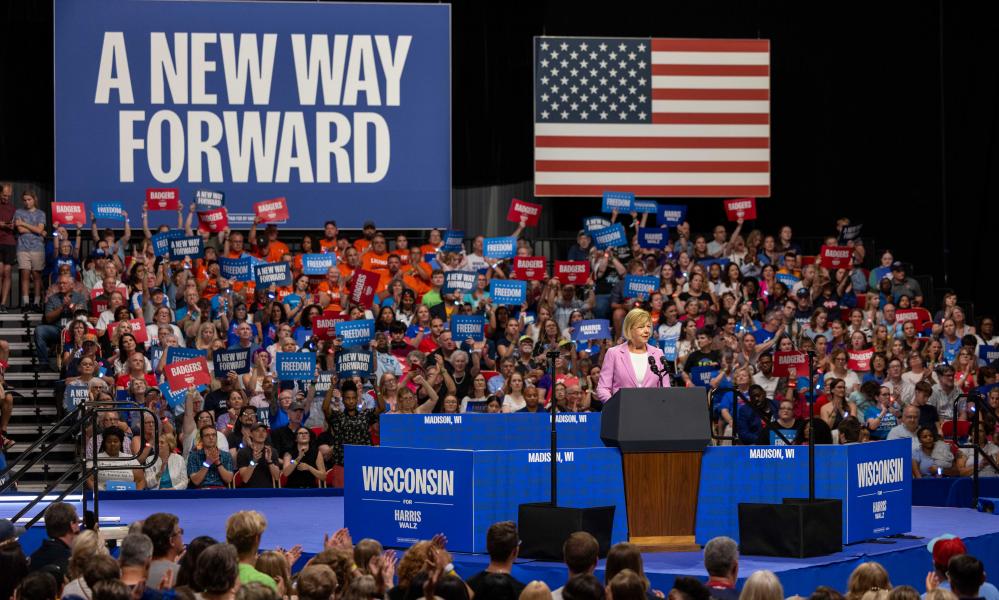As the competitive race between Wisconsin Senator Tammy Baldwin and her Republican challenger Eric Hovde intensifies, both campaigns have escalated their strategic efforts. This election holds significant importance as it could influence the control of the Senate. Recent analyses indicate that Baldwin, who initially held a comfortable lead, is now practically tied with Hovde, highlighting the evolving dynamics of the race. The Hovde campaign has intensified their messaging, aligning themselves with the “parents’ rights” movement in a bid to sway voters by connecting Baldwin with funding for LGBTQ+ youth-care initiatives. These ads aim to appeal to a segment of voters concerned about the impact of progressive policies on children.
A notable advertisement from the Senate Leadership Fund—a Super PAC focused on supporting Republican Senate candidates—claiming Baldwin endorsed providing puberty blockers and gender-transition surgeries to minors, illustrates the charged narrative surrounding this election. The ad cites Baldwin’s decision to support Governor Tony Evers’ veto of a Wisconsin bill that sought to ban gender-affirming care for minors. In response to the situation, Baldwin asserted that trans youth deserve to feel safe, emphasizing their right to access necessary health care without political interference. This aligns with broader research indicating that gender-affirming care can significantly improve the well-being of transgender youth battling issues such as gender dysphoria, depression, and suicidal tendencies.
In tandem, the Hovde campaign’s portrayal of Baldwin’s support for Briarpatch Youth Services—a non-profit assisting at-risk and homeless youth—accuses her of funding an organization promoting an “aggressive LGBTQ agenda.” Contrary to these claims, the executive director of Briarpatch clarified that their services focus on providing critical support to youth in need, regardless of political opinions. This misleading characterization is reflective of a growing trend to vilify LGBTQ+ organizations amidst a backdrop of rising anti-trans sentiment, compounded by the “parents’ rights” movement that seeks to exclude discussions around race, gender, and sexuality from educational narratives.
Furthermore, Hovde’s campaign has positioned itself firmly against what they perceive as inappropriate discussions of sexuality and gender identity being introduced to children without parental consent. This rhetoric aligns with a broader national conversation around LGBTQ+ rights, which has become increasingly polarized in recent years. As a spokesperson for Hovde articulated, there is a belief that taxpayer funds should not support programs that engage youth on these sensitive topics without extensive input from their parents, especially those involving confidential support mechanisms for LGBTQ+ individuals.
From a political standpoint, this election presents a unique challenge for Democrats. With a narrow control of the Senate and several vulnerable seats across conservative states, Baldwin’s race is crucial to maintaining the party’s influence. Critics of Hovde’s strategy argue that his approach has been desperate and is a distraction from issues that directly affect voters. Democratic representatives argue that attacking Baldwin for her sexual identity, as seen in ads that target her partner’s profession, reflects a persistent effort to delegitimize her candidacy and distract from more pressing electoral issues. The prevailing sentiment among her supporters indicates that Baldwin’s sexual orientation does not detract from her appeal or effectiveness as a senator.
In conclusion, the Wisconsin Senate race illustrates the broader tensions within American politics, particularly against the backdrop of LGBTQ+ rights and gender issues. As both camps gear up for the final stretch of the campaign, the impact of targeted advertising and the framing of these sensitive issues could significantly shape voter perceptions. Baldwin’s resilient stance on LGBTQ+ youth rights contrasts sharply with Hovde’s more conservative platform, revealing a critical fork in the road for Wisconsin voters as they approach Election Day. Ultimately, this election is not only about individual candidates but also reflects deeper societal conflicts over identity, rights, and the role of government in personal lives.

